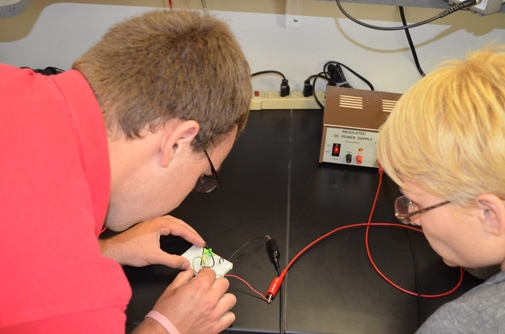News From David Grindle, USITT Executive Director
Appreciating our Differences

Learning all about bits and bytes and nibbles (half a byte) was a bit different for the participants in the 2013 Costume Symposium at Rochester Institute of Technology, but the group soon understood how to create circuits and program LEDs in costumes and props.
Photo/Barbara E.R. Lucas
Our home is full of the humor of early teens. In our case, this manifests in jokes about musicians. "What do you call a dozen tubas at the bottom of a lake?" *
These jokes come as the boys learn to get along with other musicians who play instruments that they could not imagine playing themselves. I pair this experience with an article in the June issue of Smithsonian Magazine which explores the psychology of why we like things.
According to research, humans with roughly nine exposures to something have a tendency to begin to "like" the food, sound, image, etc. Parents are often reminded of this when getting young children to try new foods.
How are we at getting through our nine exposures? Sometimes we discover that the exposures come with age. But in the world of design and technology, we encounter this exposure issue with our productions.
I can think of several shows that I stage managed in my career that I "grew to love" after exposure to them. I can think of one in particular that I was sure I would rather gnaw my arm off than manage, and now it is my favorite show.
Others I didn't necessarily grow to love, but did grow to appreciate. The complexity within the plot, staging, or music took multiple exposures to begin to understand and appreciate. I have no desire to do the show again, but I can appreciate the beauty of it after weeks of rehearsal and performance.
Often we feel the same way about the various areas of our craft. We think designers give no thought to how something will be realized, technicians don't care about the art, and management is, well, management. The sad part is, this perception comes because some of us don't take time to develop the taste for one another's work.
I am admittedly fabric illiterate. I think sewing machines are unnecessarily complex, and draping is the closest thing to a violation of physics that humans do. But taking the time to observe, learn, and – God help me – even try these skills brought exposure that allowed me to develop a taste or appreciation for that work.
Often I hear young designers and technicians speak playfully about the ease of the other person’s work. Occasionally I hear them say these things and mean them. They truly don't have an appreciation for the work that their colleagues do. This comes from that lack of exposure.
In a collaborative art, we must have an appreciation or taste for the work others do. We must take the time to learn to appreciate the art each of us brings in order to provide collaborative and constructive criticism rather than uninformed criticism.
An appreciation doesn't mean we will like the work of others, but we will know what it takes to get the job done and can appreciate when that effort has been given rather than dismiss it.
Throughout life, our tastes change, and so does our ability to appreciate the art around us. Take some time to increase your exposure to the work your colleagues put forth. I believe it will help develop a complex appreciation of the people and world around you.
* a good start


We'd like to hear your comments on this story.
Please e-mail David at david@usitt.org.